Sunny Freiburg im Breisgau has a lot going for it. Hugging the western edge of the Black Forest, this university city has a compact Old Town (Altstadt), a show-stopping Cathedral and more cafes and restaurants than you can shake a stick at.
I used Freiburg as a base to explore the Black Forest but quickly discovered that it was a lovely destination in its own right.
Make the most of your visit with my guide to the best things to do in Freiburg, Germany. Whether you are spending just a day here or are using the city as a base for visiting the surrounding area, it’s packed with tips, including places to visit, how to get there, where to eat and where to stay.
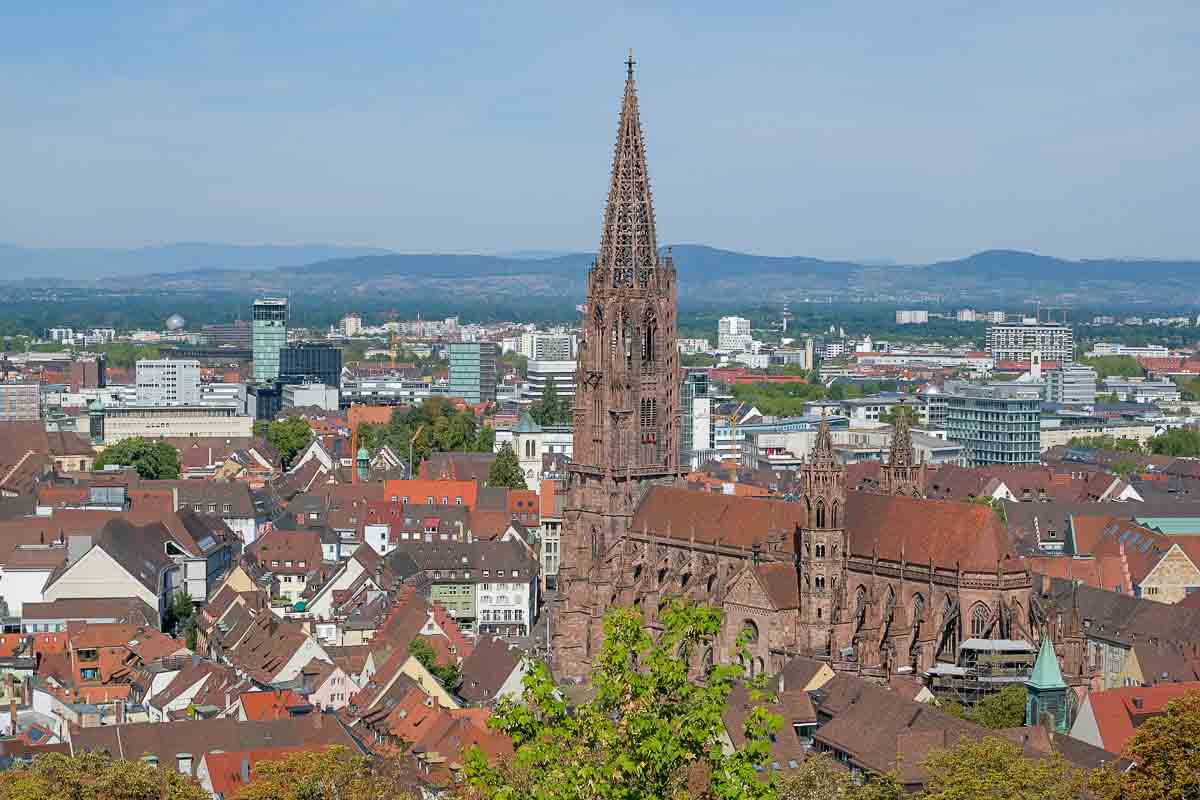
Some articles on this website contain affiliate links. This means that I may earn a small commission if you make a purchase through these links. As an Amazon Associate, I earn from qualifying purchases. Read the full disclosure here.
How I Visited (and what I thought)
Make no mistake. Freiburg isn’t a fairy-tale town in the mould of Bacharach or Rothenburg ob der Tauber. But what the city lacks in the absence of wonky half-timbered houses it makes up for a superb cathedral, affordable restaurants, excellent microbreweries and its proximity to the Black Forest.
I visited Freiburg im Breisgau as a solo traveller in August. It was hot and sticky with the mercury nudging 30 degrees.
Given the choice again, I would visit in spring or autumn when temperatures are more comfortable for sightseeing. I also fancy seeing the fall foliage lighting up the adjacent Black Forest.
Winter in Freiburg can be cold and snowy and the city is home to its famous Christmas market.
I stayed here for four nights in Friedrich Boutique-Apartments. This was enough time to explore the city at a leisurely pace and take a few day trips to the Black Forest, including Schauinsland and the Hell Railway to Titisee.

A Potted History of Freiburg im Breisgau
Freiburg im Breisgau is tucked into the southwest corner of Germany, close to its borders with France and Switzerland. It has a population of around 230,000.
The clue to Freiburg’s origin is in its name. It was founded and chartered as a free market town in 1120 by the dukes of Zähringen.
From the early 13th Century to the 18th Century it passed hands between the counts of Urach, the mighty Habsburgs, the Bauernbund (Peasants’ and Farmers’ League), the Swedes, the Bavarians and the French. In 1806, Freiburg was returned to the ruling house of Baden.
Allied bombing raids in 1944 destroyed much of the city’s Old Town. However, a handful of historic buildings survived, including the Münster. The Old Town was rebuilt, sticking faithfully to its medieval plan.
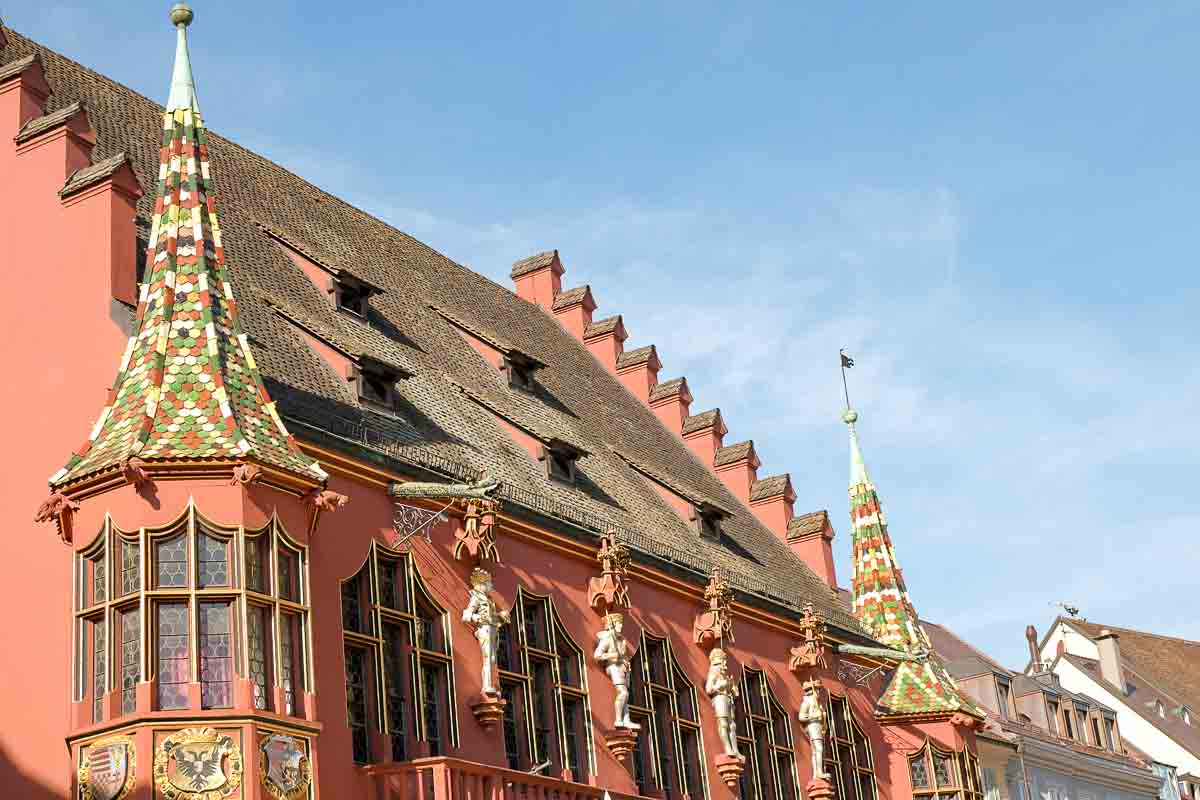
My Favourite Things to Do in Freiburg im Breisgau
Hit the ground running with my pick of the bunch. You should be able to cover all these attractions in one relaxed day, but I have included a few bonus destinations later in this guide if you are lingering longer.
Here’s a map to help you on your way. For an interactive map and to send it to your smartphone, click here or on the image itself.
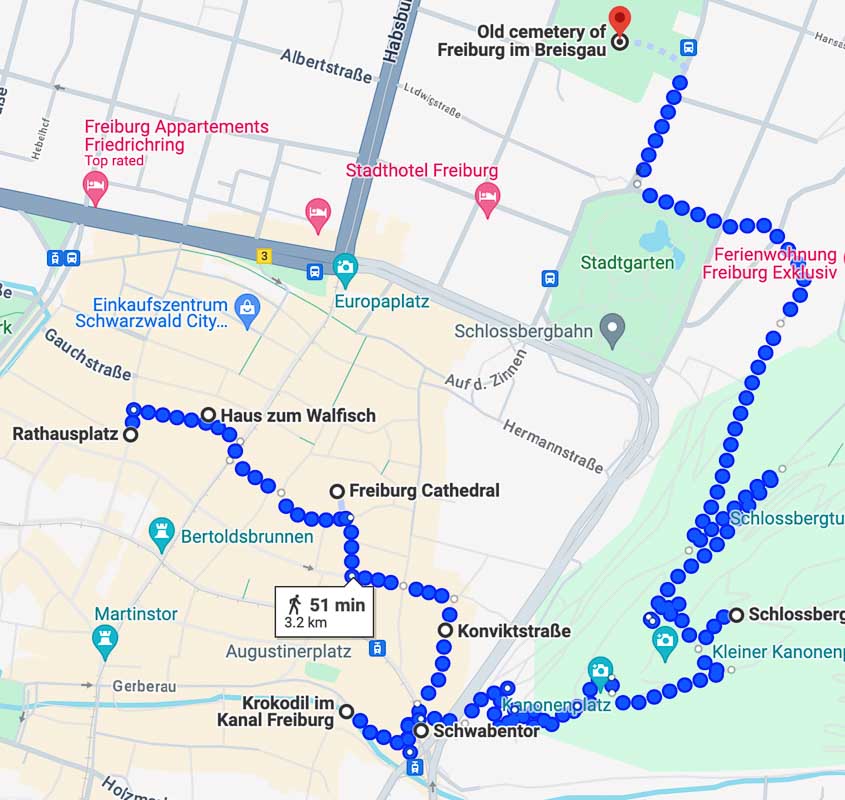
You can use this as a self-guided walking tour of Freiburg. Without any deviations, the total distance is just around two miles.
1. Admire the two town halls of Rathausplatz
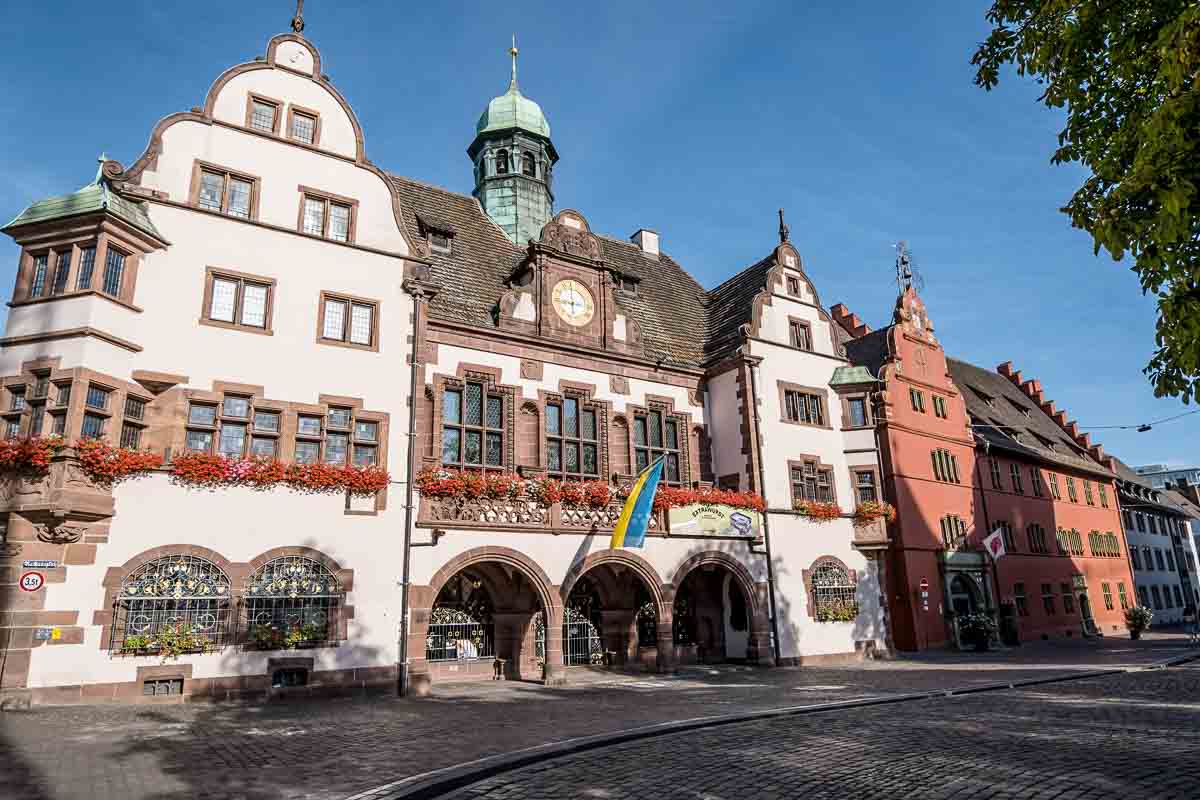
Freiburg im Breisgau has not one but two town halls, both of which face Rathausplatz.
Adorned with a double eagle reminding us of the four centuries of Habsburg rule, the red Old Town Hall is on the right. The two-tone New Town Hall, once the site of Freiburg’s university, is on the left.
Mosaic coats of arms representing Freiburg’s sister cities are embedded in the cobbles in front of the town hall buildings. These include Padua in Italy, Isfahan (Iran) and Madison (USA).
Rathausplatz is the former cloister of the neighbouring Franciscan Church of St. Martin. At its centre is a statue of Berthold the Black, a medieval monk falsely credited with inventing gunpowder.
2. Float your boat along one of the city’s bächle
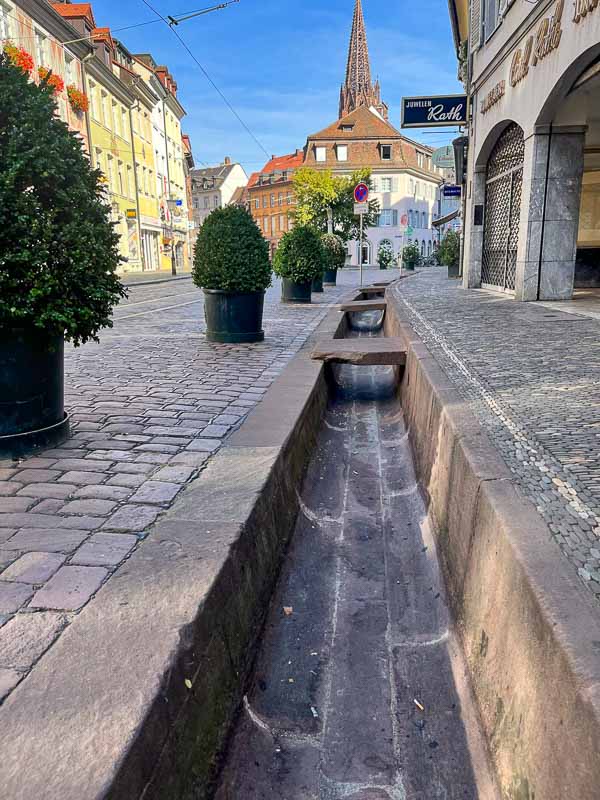
Freiburg is famous for its bächle, the narrow canals that have run down most of the city’s streets since medieval times.
Over the centuries, these “stream-lets” (as their name translates) have stopped fires from spreading and have been a water source for the city. Today, youngsters – and the young-at-heart – like to sail little boats along the bächle. When I visited during a summer heatwave, they were bone dry.
Local legend says that if you fall into a bächle, you will marry a Freiburger. I did and I haven’t. All I got for it was a busted foot!
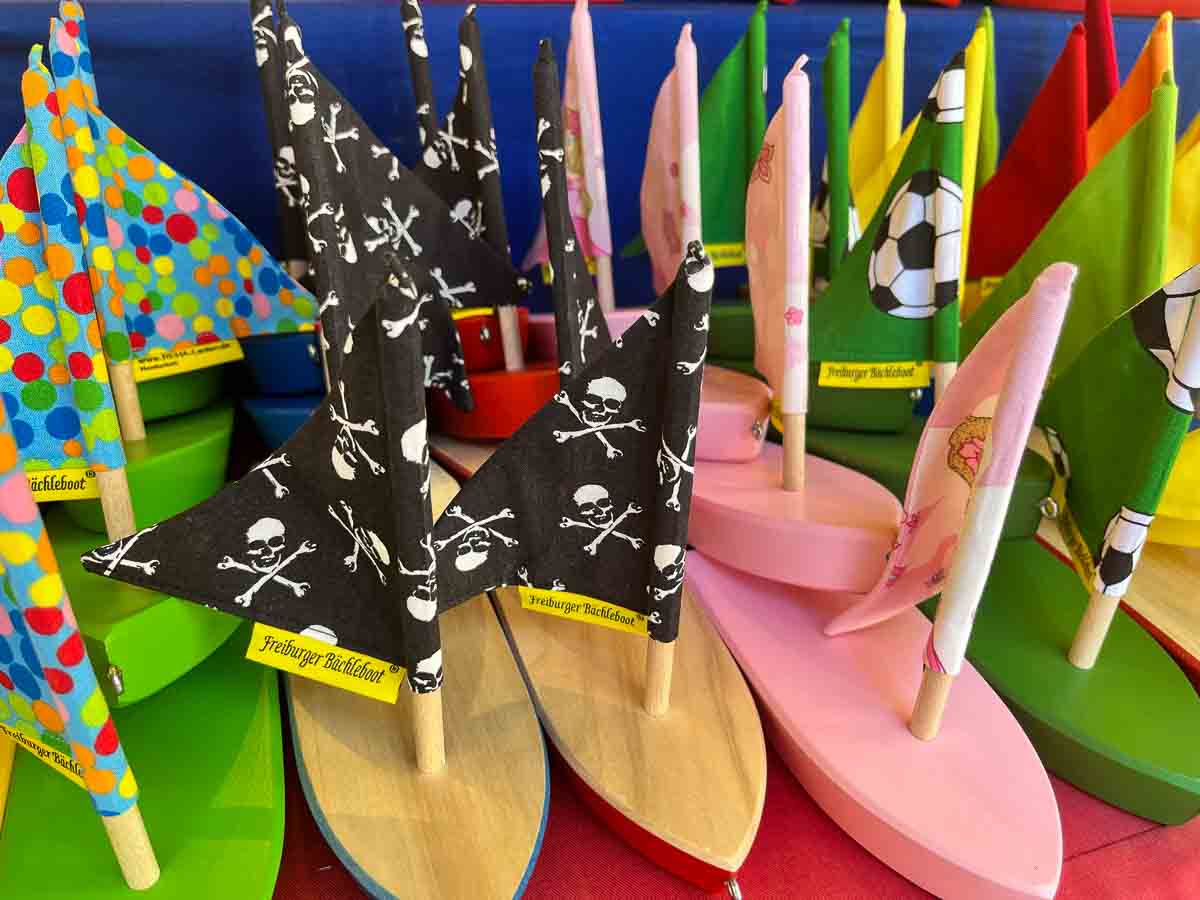
3. Take a look at the former house of Desiderius Erasmus (House of the Whale)
Rotterdam-born Desiderius Erasmus (1469 – 1536) was a philosopher and humanist who studied extensively abroad to avoid persecution for his views. He lends his name to the Erasmus Programme, a European exchange initiative designed to enable students to gain experience in another country.
Erasmus once lived in the House of the Whale (Haus zum Walfisch) at Franziskanerstrasse 5. This building is embellished with a gruesome gargoyle with a goitre dangling from her neck, one of the many whimsical statues in Freiburg.
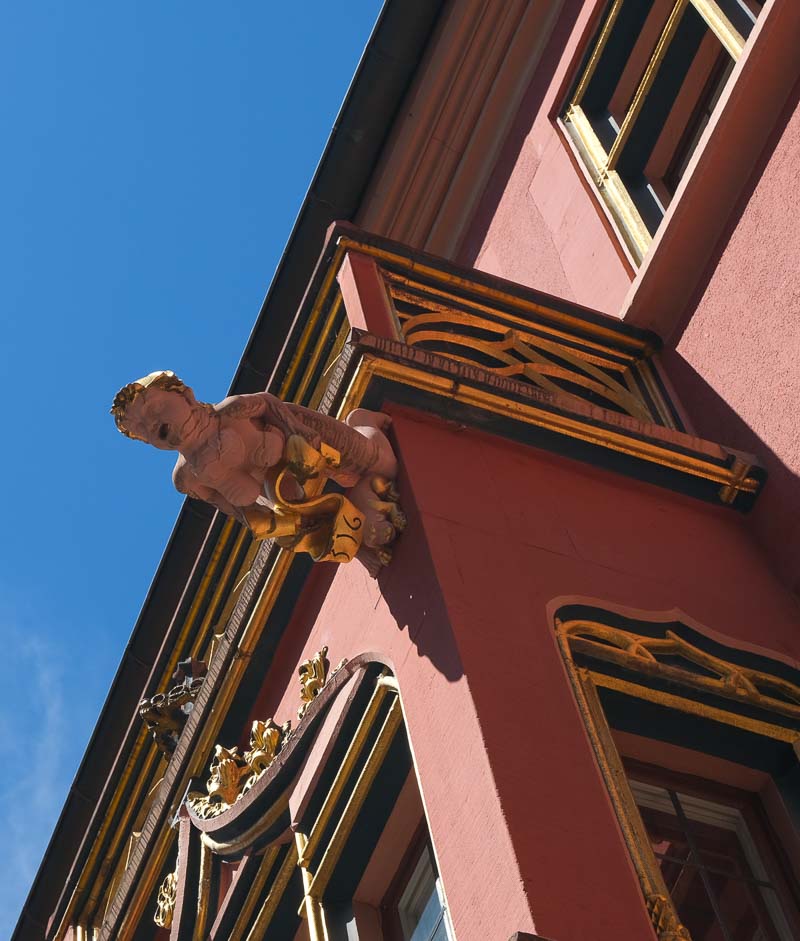
4. Marvel at the grandeur of Münsterplatz
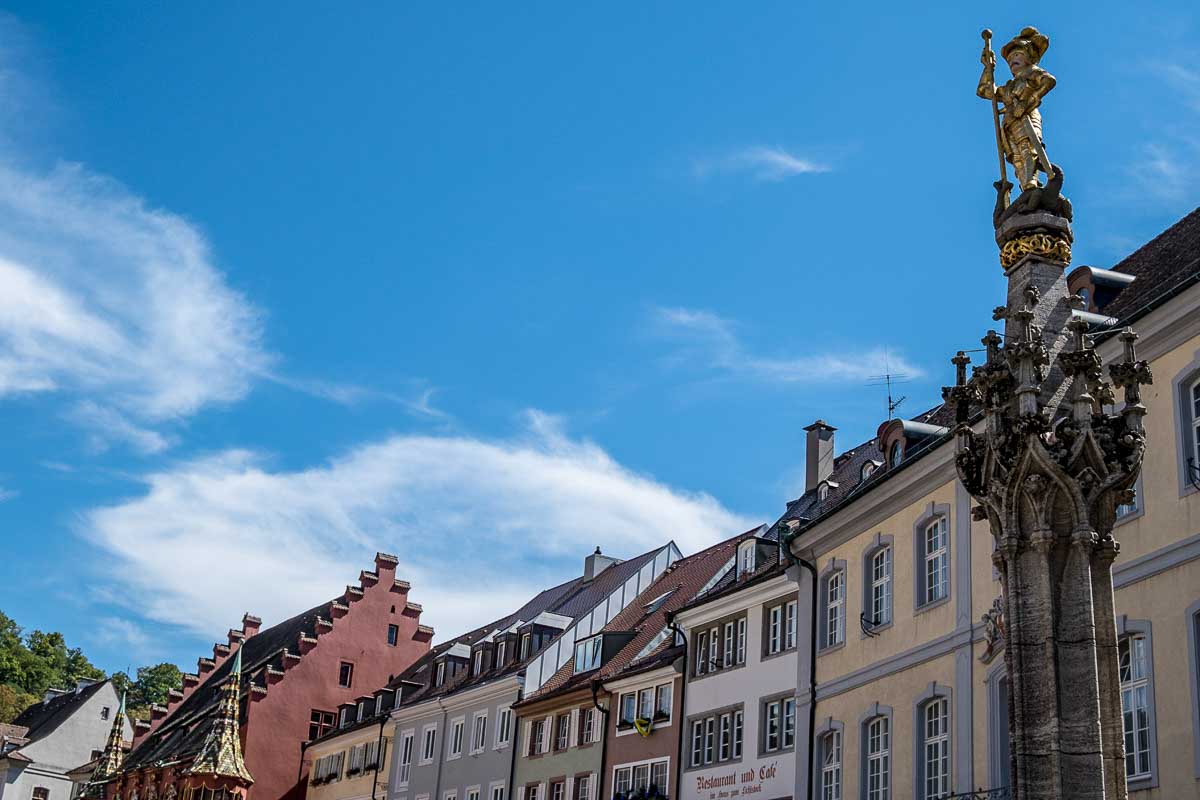
When you reach Münsterplatz, twirl around and do a 360-degree tour.
This is Freiburg’s beating heart, dominated by the majestic Münster. Examine the gargoyles adorning the side of the cathedral and try to spot the “mooning” gargoyle.
With your back to the cathedral’s gargoyles, look at the Historical Merchant House (Historisches Kaufhaus). Dating from 1532, this was Freiburg’s customs and trading centre.
The grey building next to the Historical Merchant House houses the City History Museum.
Further to the left is the Alte Wache, a former police station turned wine bar.
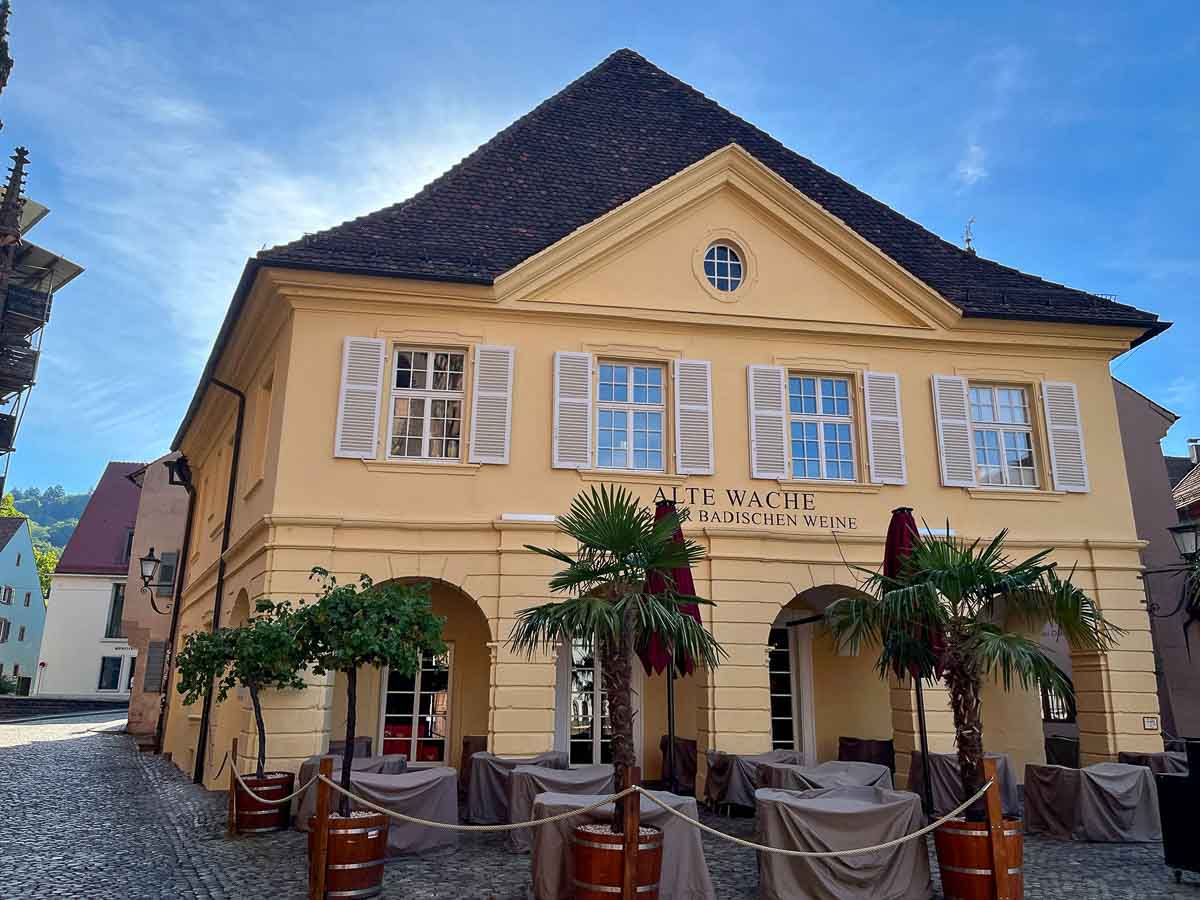
A market is held in Münsterplatz every morning except for Sundays. It is at its most lively on Wednesdays and Saturdays.
5. Gorge on the glory of Freiburg Cathedral (Münster)
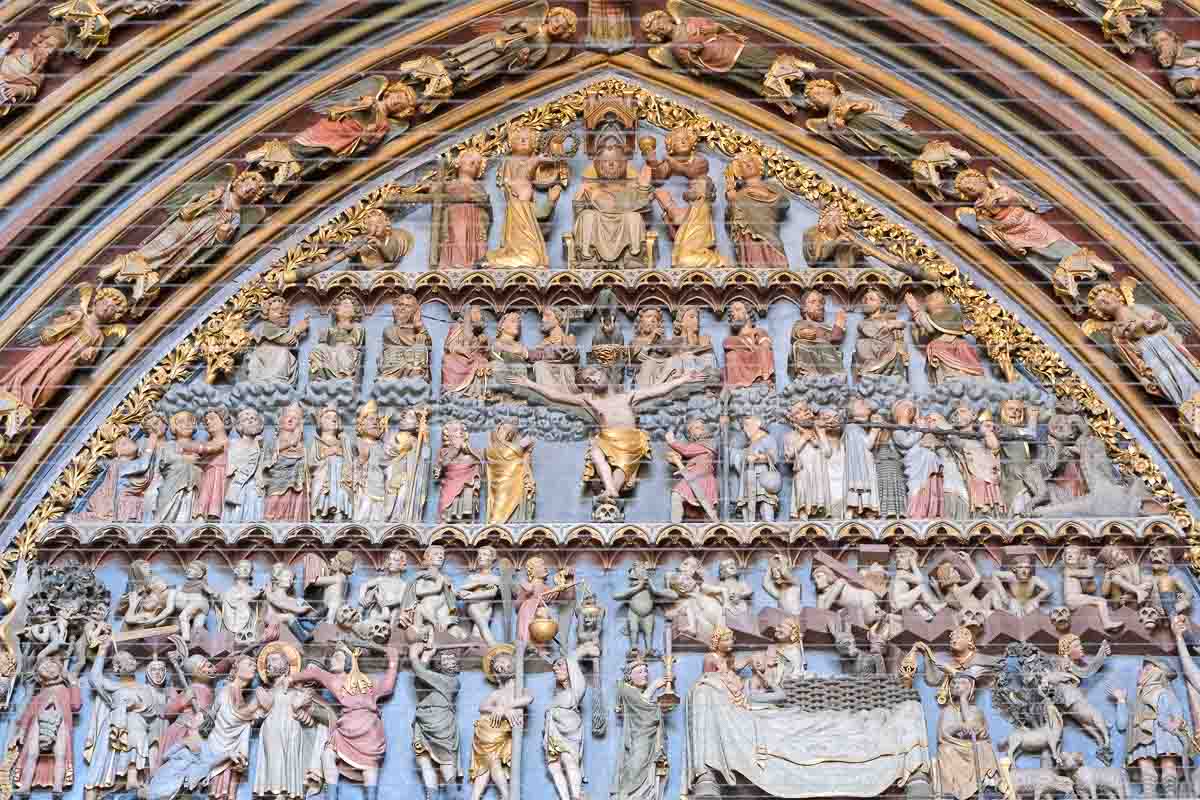
The lacy spire of the Münster piercing the sky 380 feet above Münsterplatz is one of Freiburg’s most iconic sights. Whilst it is no match for Cologne Cathedral or Berlin’s Kaiser Wilhelm Memorial Church, visiting the cathedral is unmissable even if you have only a day in Freiburg.
Officially called the Catholic Cathedral of Our Lady, work started on this Gothic sandstone cathedral in 1200. It was one of the few buildings in Freiburg to survive the devastation of World War II.
The cathedral’s original stained glass windows date from the 13th and 14th centuries, each marked with the seal of the merchant who sponsored it (these were removed and stashed away during WW2). A 12th-century triumphal crucifix dangles over the choir.
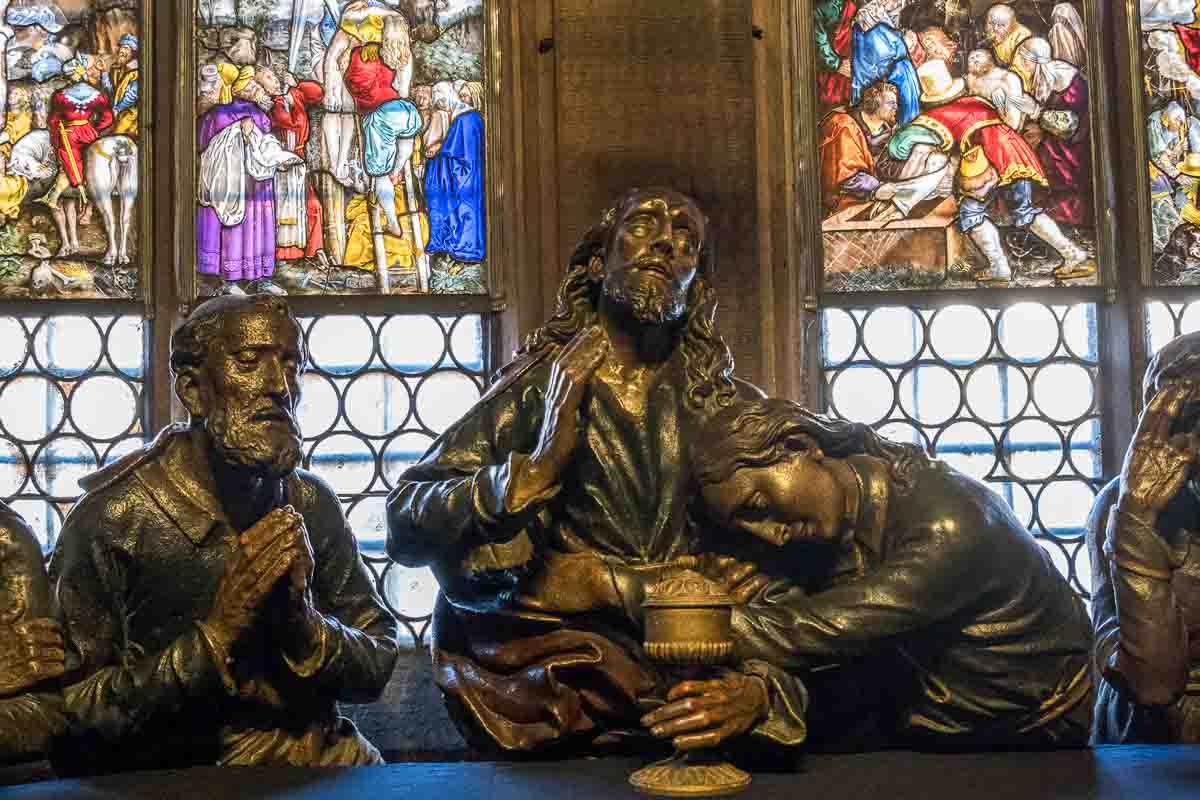
Opening hours: These vary from day to day. Check the current opening hours for Freiburg Cathedral here.
Admission cost: It is free to visit the cathedral. However, a small charge applies to visiting the choir and chapels. In my view, this is €2 well spent and you receive a useful leaflet as part of the deal.
You can also climb the Münster’s bell tower for a small charge. I didn’t do this as I figured that Freiburg’s main landmark, namely the cathedral itself, would be absent from the view.
6. Walk along the prettiest streets in Freiburg’s Altstadt
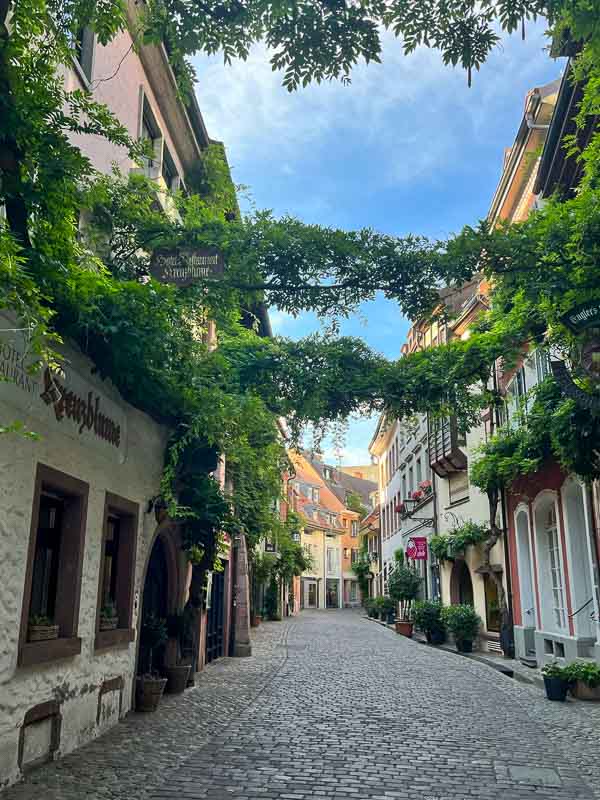
Two of Freiburg’s prettiest streets lie in the heart of the Altstadt. Although the Old Town dates back to the 12th Century, it was largely rebuilt after World War II bombs levelled 80% of the city centre.
Many of the houses on bächle-lined Schusterstrasse are labelled with mosaic seals, denoting the purpose of the building. Although the houses’ labels date from the Middle Ages, the mosaics are more modern.
Konviktstrasse is another typical Freiburg street. This picture-perfect lane takes its name from a convent and is draped with sweet-smelling wisteria in springtime.
At the end of Konviktstrasse is Salzstrasse where you’ll find the city’s original hotels and pubs.
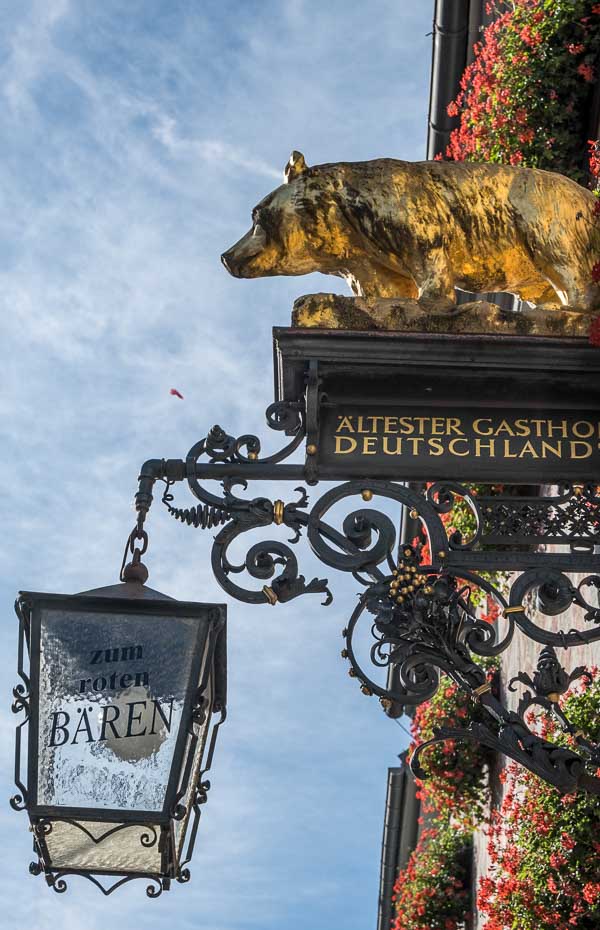
7. Say “hello” to Freiburg’s crocodile
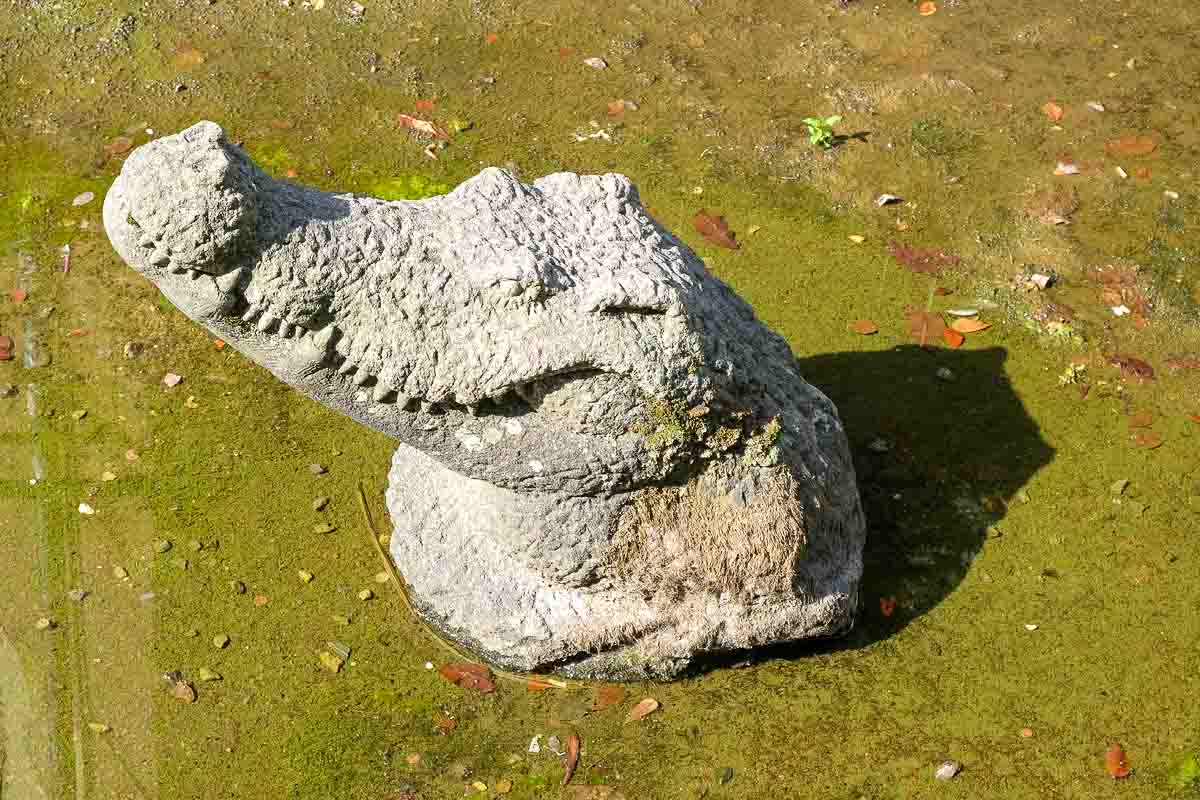
Formerly the territory of tanners and millers, Freiburg’s industrial quarter has been transformed into a canal-side district. It is home to a few appealing restaurants with beer gardens and the city’s resident crocodile.
8. Stop by Swabian Gate (Schwabentor)
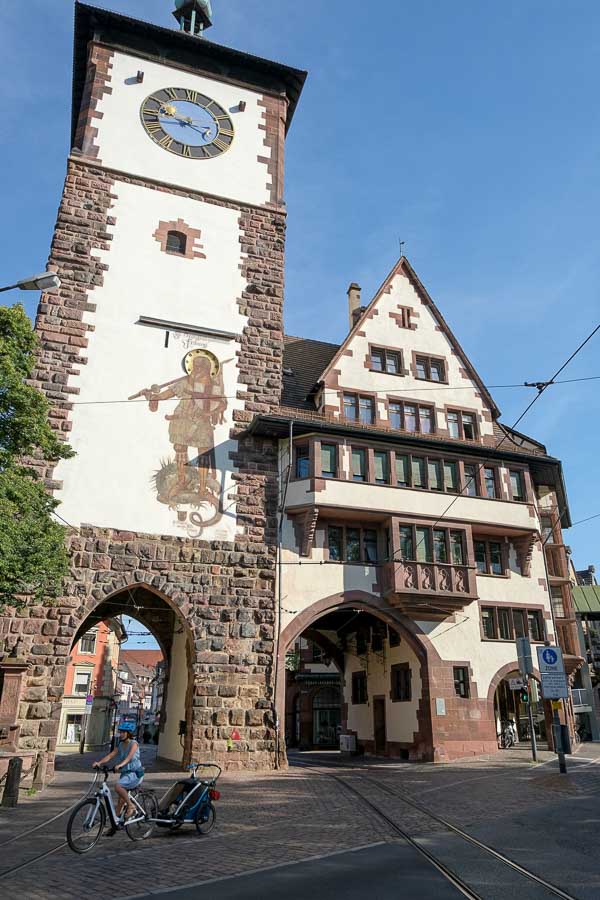
Double back to one of Freiburg’s two surviving gates. Schwabentor is named after the Swabians who were the Freiburgers’ rivals back in the day.
Salt mining was a growth industry in the 13th Century and the painting on the arch of the gate is of a merchant with his wagon groaning with salt kegs. Below this painting is a small figure pulling a thorn out of his foot, a stern reminder to the city’s residents to steer clear of the “thorns” of sinful living.
9. Take in the views from Castle Hill (Schlossberg)
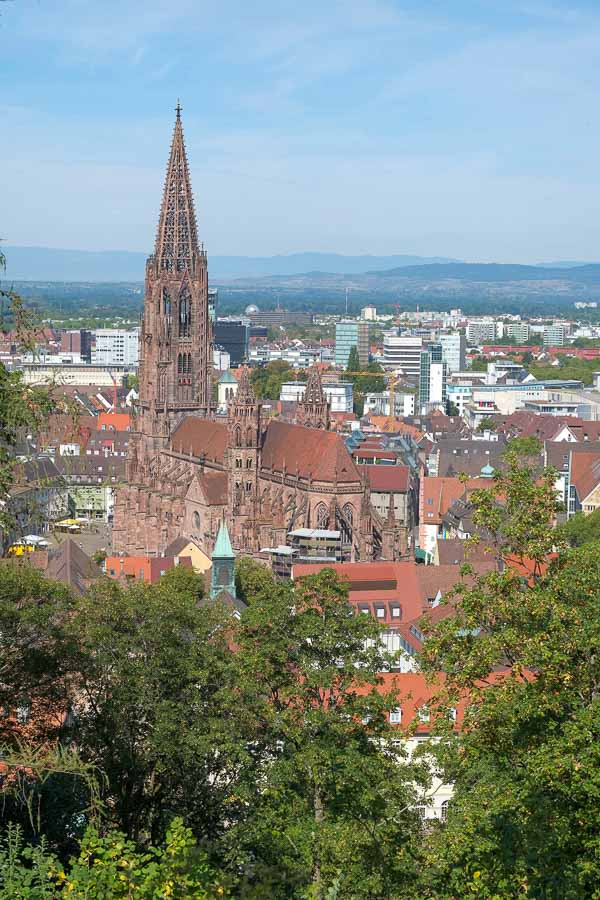
Once the site of a French 18th-century fort, Schlossberg looms above the eastern end of Freiburg’s Old Town. This hulking fortress, which could garrison 150,000 soldiers, was all but destroyed when the French retreated.
Today, Schlossberg is hugely popular for its unbeatable views of Freiburg and hiking trails of different lengths. If you are short on time, turn right when you exit the funicular and walk five minutes to Kanonenplatz for the best view of the Münster and the forests and vineyards beyond.
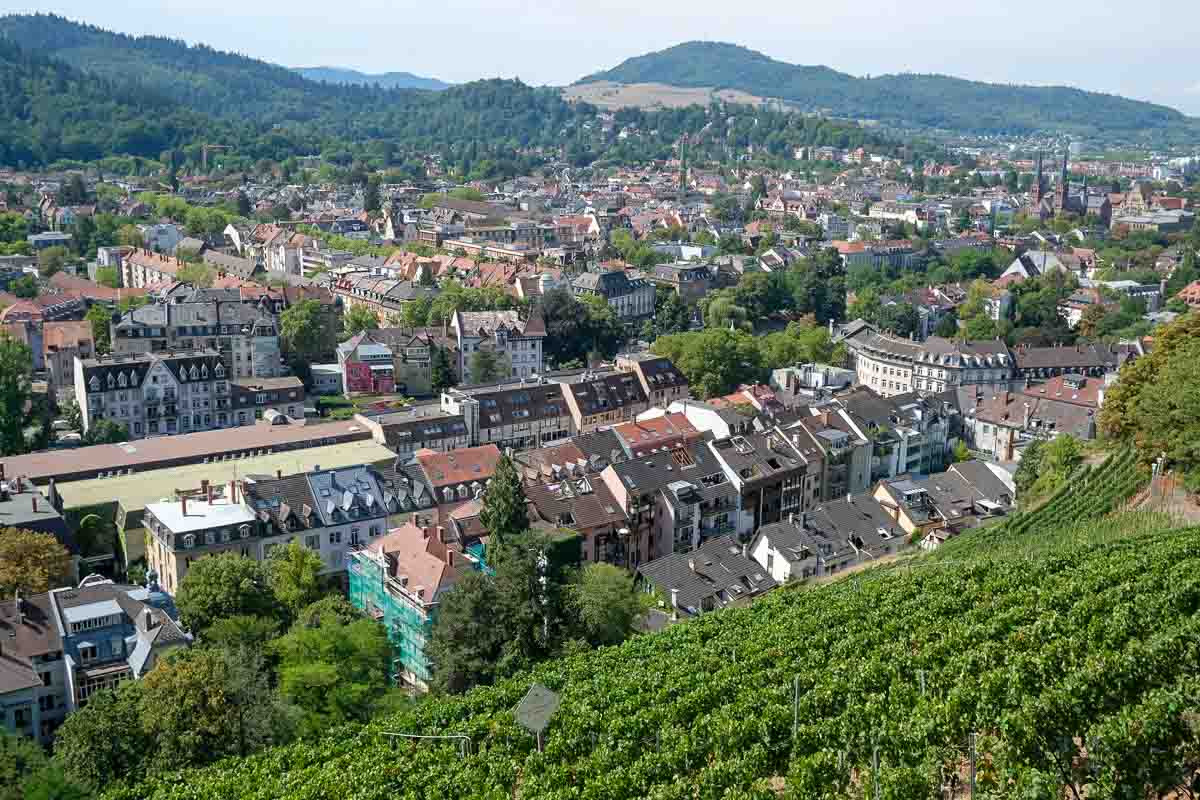
Although you can take the path opposite the Schwabentor to hike up to Schlossberg, I recommend riding the Schlossbergbahn (funicular railway). Find out more here.
10. Visit the Old Cemetery (Alter Friedhof)
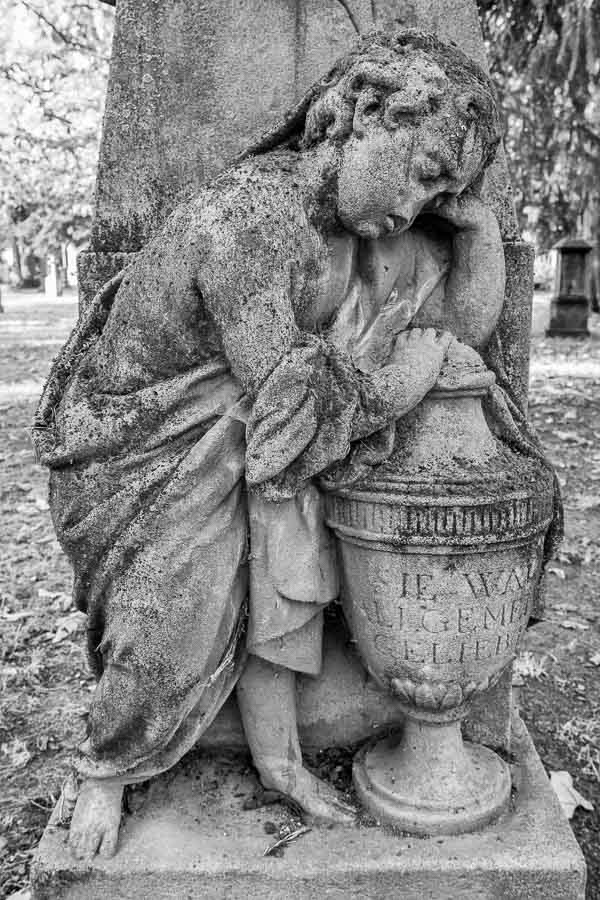
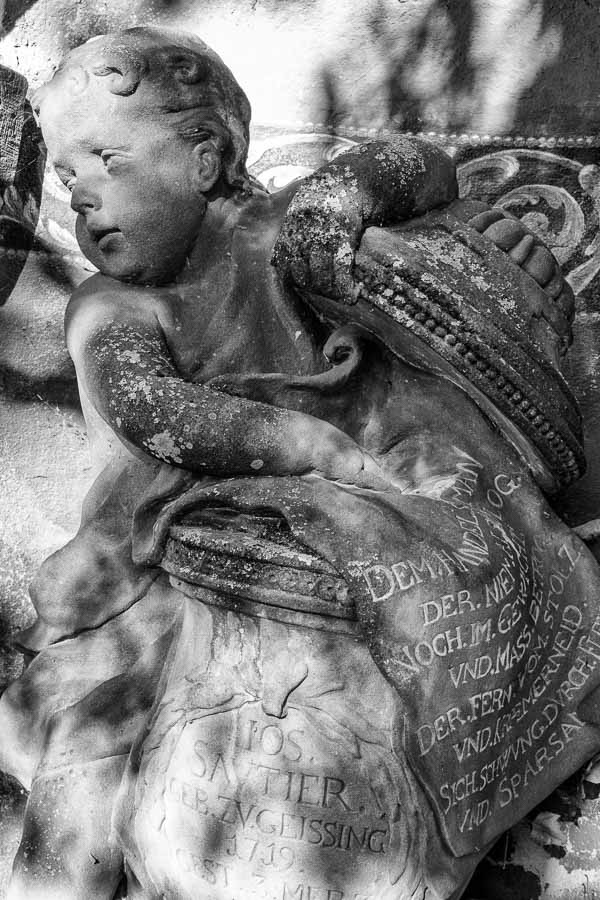
It may not be everybody’s cup of tea but the Old Cemetery was one of my favourite places in Freiburg.
Alter Friedhof is one of the oldest cemeteries in Germany that have been preserved in their entirety. It was the final resting place for Freiburg’s deceased between 1683 and 1872 and was rededicated as a park after its closure. There are around 1200 tombstones
It is a peaceful and fascinating place for a stroll. Some of the stone sculptures are wonderfully expressive and some of its gravestones are works of Baroque and Neoclassical art.
Built in 1720, St. Michael’s Chapel (Michaelskapelle) is in the middle of the cemetery. This was badly damaged in World War II but was faithfully reconstructed according to the original plan.
11. Try the local brew
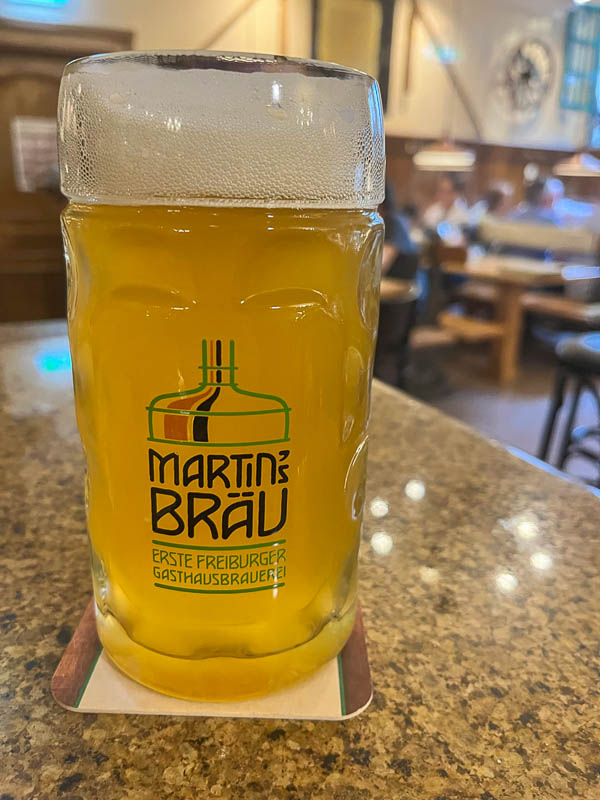
It’s gotta be done. There’s a very good reason why Germany is very famous for its beer. It is so good.
I’m more of a wine person but you can’t beat a refreshing glass of beer in a biergarten on a hot summer day.
12. Order a slice of Black Forest Gateau
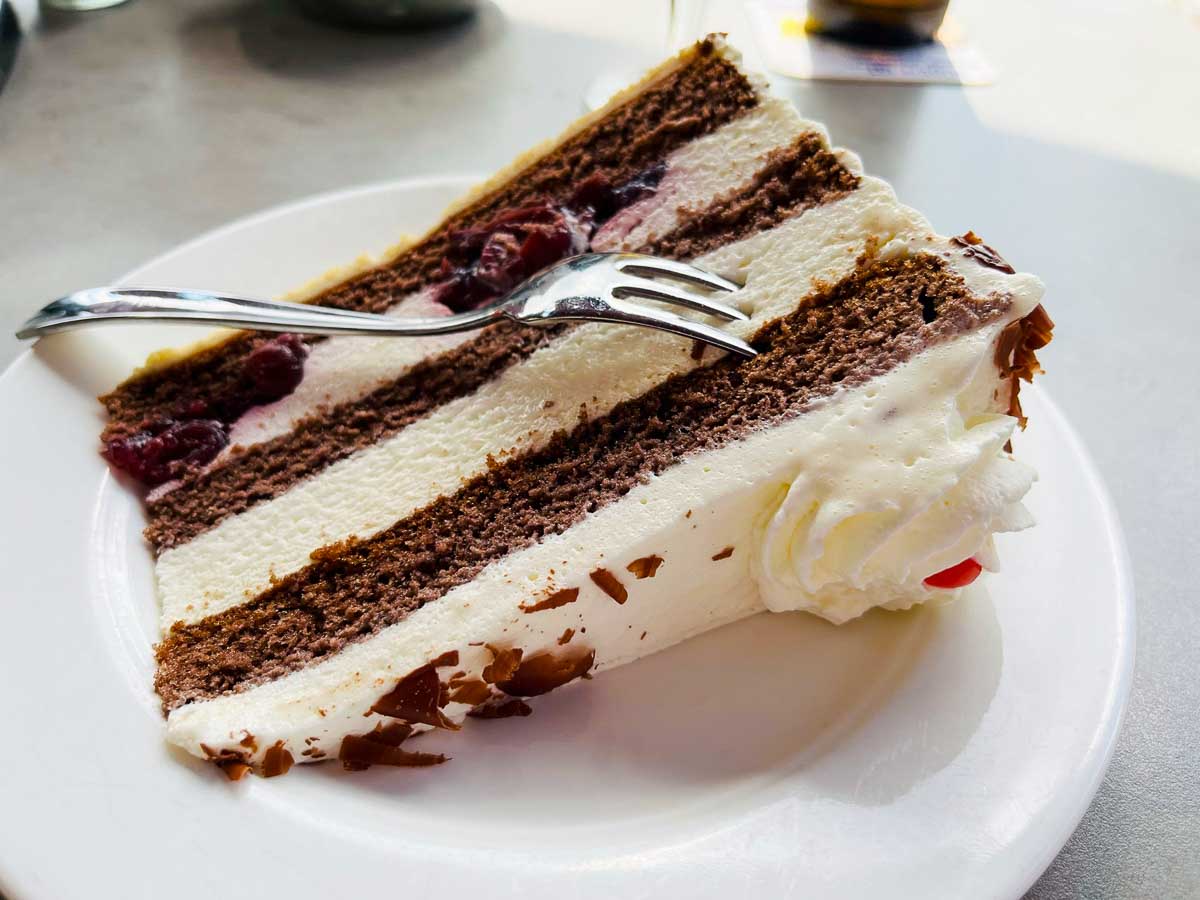
I am certainly a cake person. For one of the best slices of cake in your life, don’t leave Freiburg without trying Black Forest Gateau.
Schwarzwälder Kirschtorte (Black Forest Cherry Cake) is layers of chocolate sponge base sandwiched with kirsch-soaked cherries and whipped cream, topped with more cream, cherries and chocolate flakes. What’s not to like?
11. Visit one (or two) of Freiburg’s museums
If you are looking for a rainy-day activity in Freiburg or want to learn more about the city, make a beeline for one or both of these museums.
City History Museum (Museum Für Stadtgeschichte)
This museum tells the story of Freiburg and has a model of medieval Freiburg circa 1590 and another from the early 1700s. There’s also a wooden model of the cathedral.
Most of the display information is in German only.
The museum is on Münsterplatz and is open from Tuesday to Sunday. There is a modest admission fee.
Augustiner Museum
Housed in a former Augustinian church, this museum displays local fine art and medieval artefacts. Artistic highlights include works by Lucas Cranach the Elder and The Fall of Man, an exquisite Renaissance wooden sculpture.
The museum is on Augustinerplatz and is open from Tuesday to Sunday. Admission fee applies
Exploring the Black Forest & Beyond
Frieburg im Breisgau is a marvellous base for exploring Germany’s Black Forest and the Alsace region of France. These are my favourite day trips.
12. Ride the Schlauslandbahn Cableway
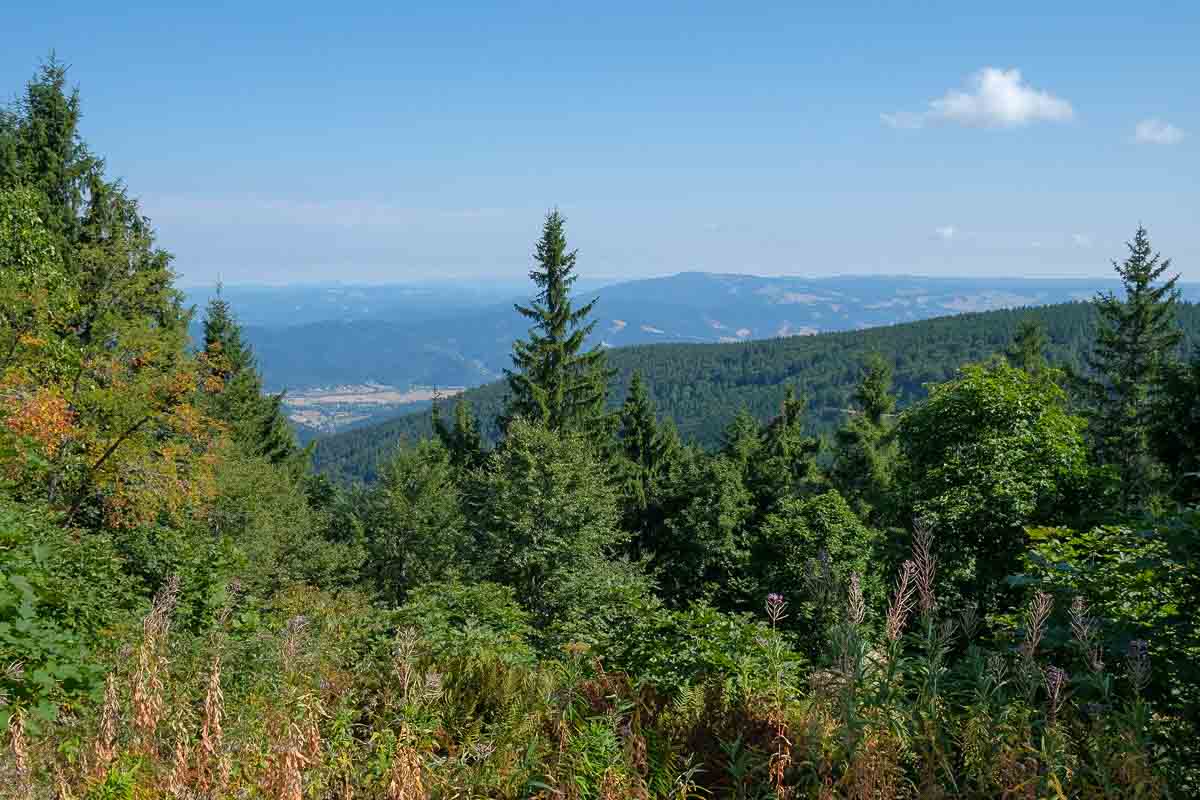
Freiburg’s own little mountain offers the best view of the Black Forest if you don’t have a car. Rising to 4,213ft (1,284m) above sea level, Schauinsland is one of the highest peaks in the Black Forest.
The Schauinsland Cableway, Germany’s longest two-way cable car system, whisks you 746 metres to the top station. The journey takes 20 minutes.
Pick up a map with suggested walking routes (Wanderkarte) before you board the cable car. These trails vary in distance between 2.5 km and 8.8 km. Although the information is in German you can scan a QR code for English language information.

How I got to Schauinsland from Freiburg
Schauinsland is 6 miles south-east of Freiburg’s city centre
From Freiburg, I took tram #2 (direction Günterstal) to Dortstrasse and transferred to bus #21 (direction Horben), alighting at Schlauslandbahn. The total journey time was around 30 minutes
The Schlauslandbahn operates year-round. However, it is closed for scheduled maintenance twice a year. You can check for updates here.
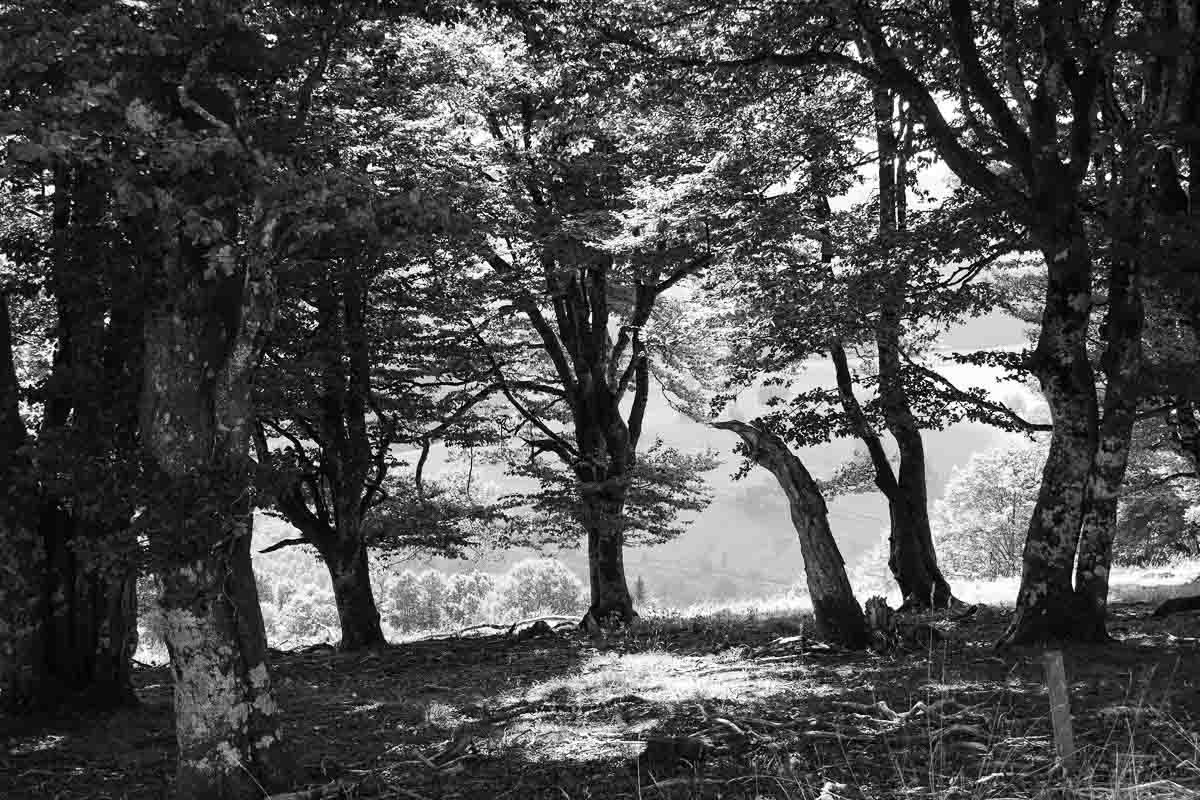
13. Take the Hell Valley Railway to Titisee
I’m always on the lookout for a scenic train ride when I am travelling and was delighted to stumble upon the Hell Valley Railway (Höllentalbahn).
Don’t let its name put you off. Linking Freiburg and Donaueschingen, it is one of the best ways of seeing the Black Forest without a car. It is also one of the steepest railway lines in Germany, travelling from an altitude of 278 m to 885 m during its 66-mile route.
Trains leave Freiburg Hauptbahnhof every half hour. Check train times and prices here.
Against my better judgment, I stopped in Titisee, a wildly popular lakeside resort but one that is completely lacking in charm. For the first time in years, I caught someone trying to short-change me.
The lake is Titisee’s one redeeming feature and I recommend a there-and-back walk along its western edge.
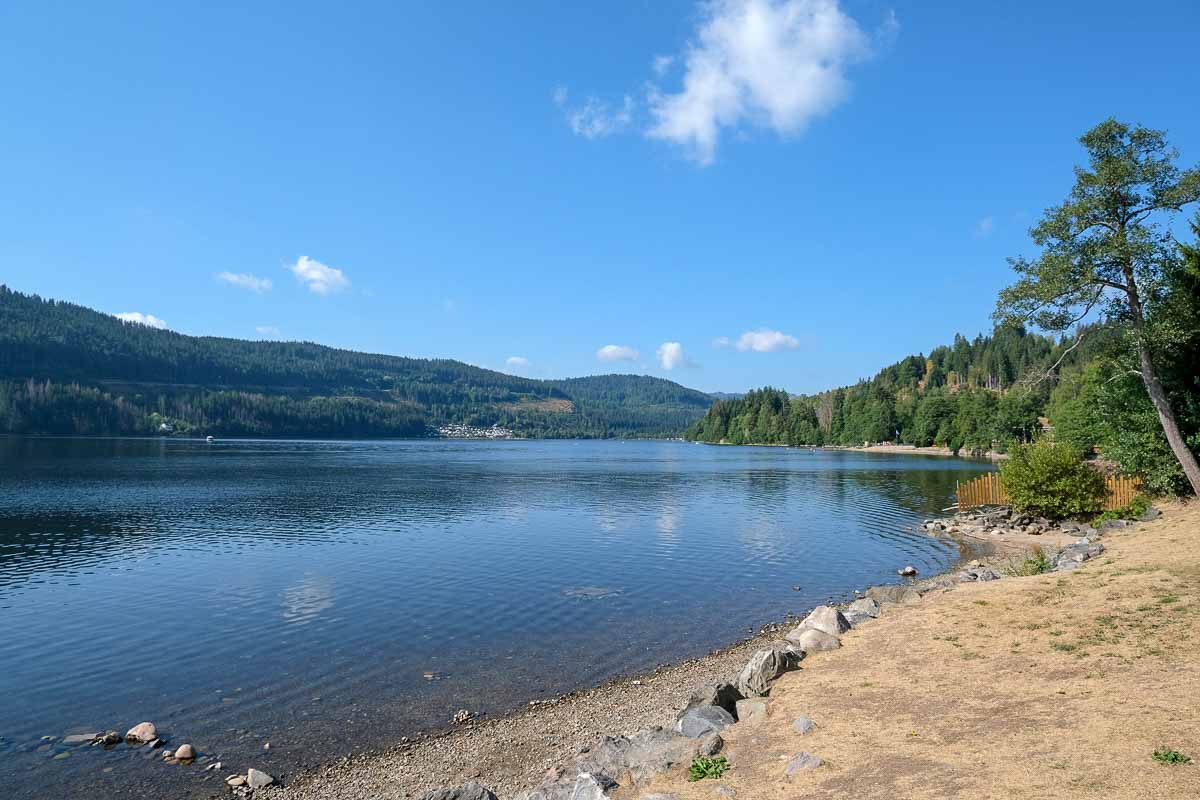
Stopping in Hinterzarten on the return journey was a better decision. This pretty and tranquil village is famous for its ski jumping.
The town’s friendly Tourist Information office gave me a free map with a short walking trail.
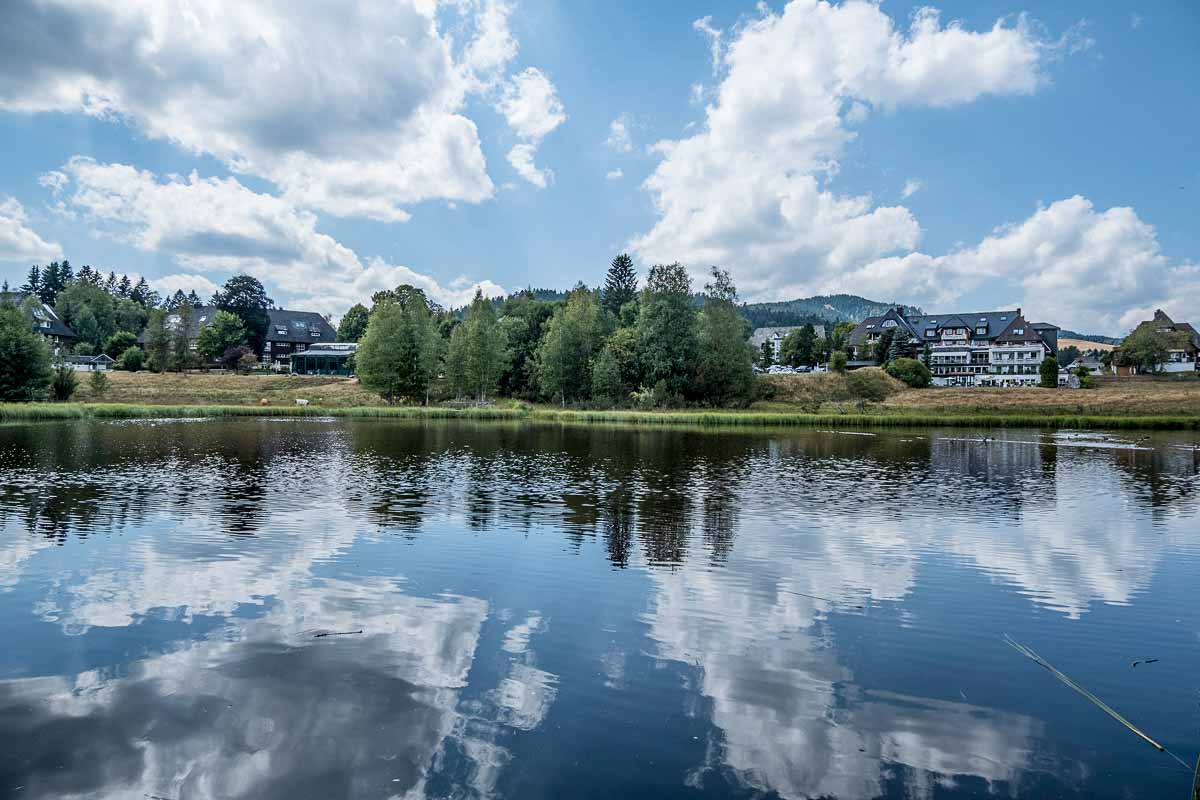
14. Take a day trip to Colmar, France
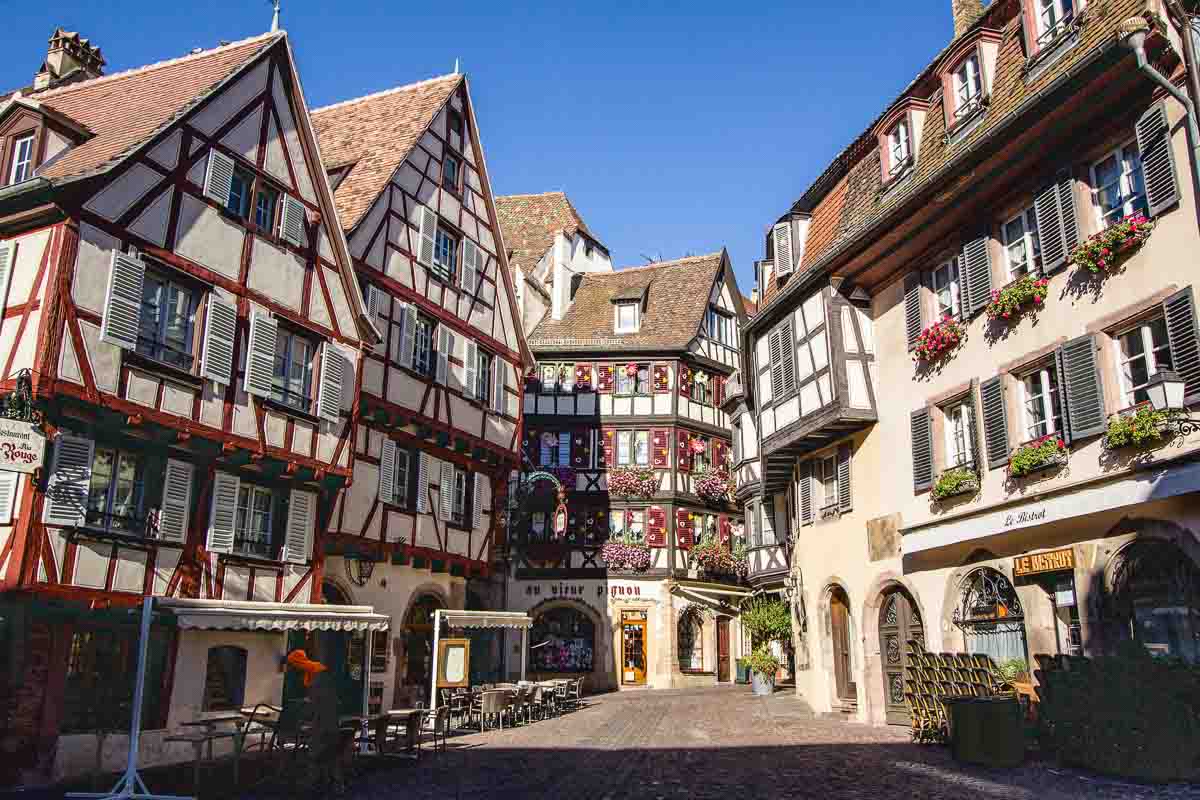
Looking for all the world like it has been lifted from the pages of a child’s storybook, Colmar is an easy day trip by train from Freiburg. Thanks to its compact size, it is easy to explore Colmar in one day with time left over to sample delicious Alsace cuisine.
The journey time by train is around two hours.
15. Visit Strasbourg, France
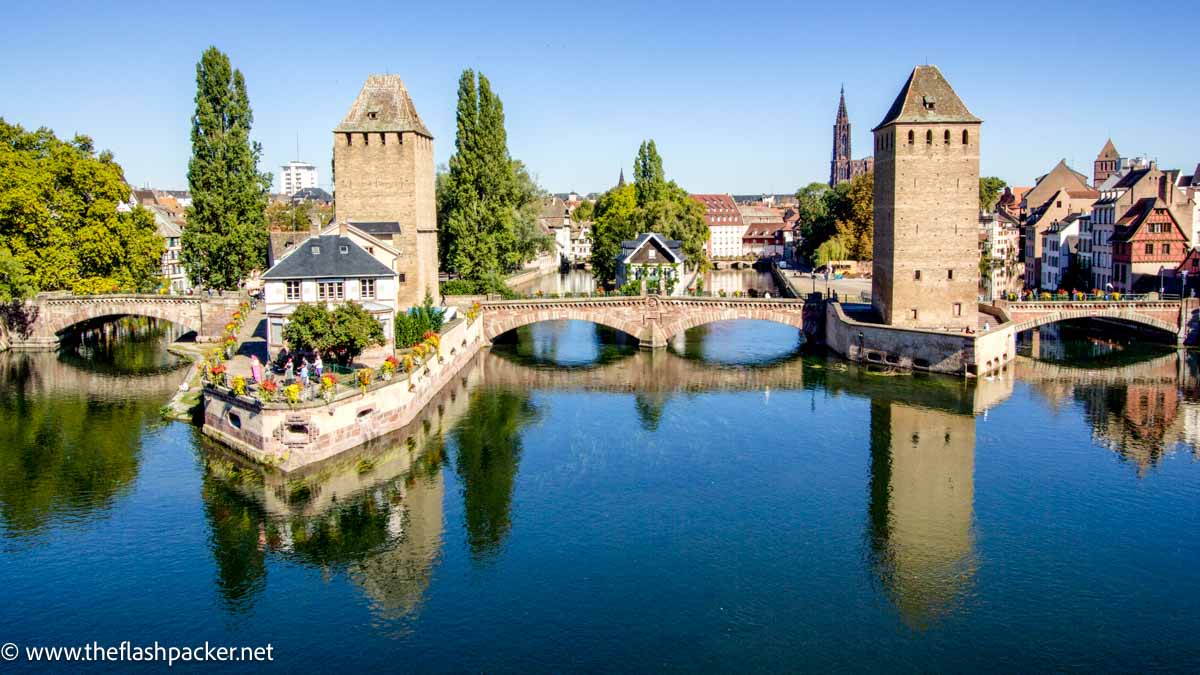
With a change of train at Offenburg, you can be in Strasbourg in 1 hour and 20 minutes.
This is one of the prettiest cities in France. Think candy-coloured, half-timbered buildings and meandering canals and you’ll have the measure of the place. Its historic city centre is a UNESCO World Heritage site and is home to one of the most magnificent cathedrals in France.
Like Colmar, you can hit the highlights of Strasbourg in a day.
Getting There and Getting Around
Getting there
By train
High-speed trains from other German cities and beyond stop at Freiburg’s Hauptbahnhof. The train station is 15 minutes on foot from the centre of town. You can check train times and prices here.
- Cologne 3 hours 20 minutes
- Frankfurt 2 hours 10 minutes
- Zürich 1 hour 45 minutes
- Strasbourg 1 hour 20 minutes
By air
Basel (BSL) and Strasbourg (SXB) are the closest major airports to Freiburg im Breisgau.
By bus
Flixbus operate bus services to Freiburg.
By car
Freiburg is off the A5 Frankfurt to Basel autobahn that cuts through the Rhine Valley. It is an hour’s drive from Basel or Strasbourg.
Getting around
Freiburg’s city centre is very walkable. You can walk from one end of the Altstadt to the other in under 20 minutes.
The excellent tram and bus system is useful for reaching outlying attractions (e.g. Schauinslandbahn).
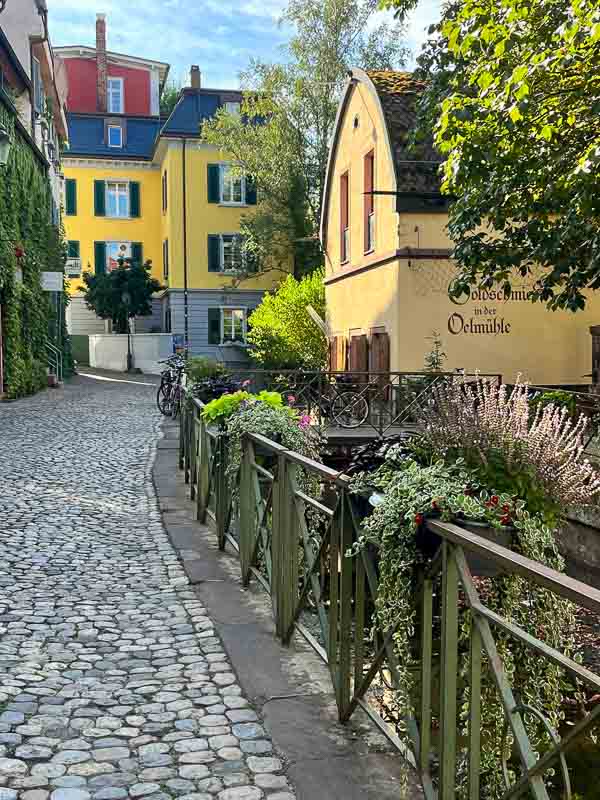
Where to Stay in Freiburg
As befits a major city, there is a wide range of accommodation choices in Freiburg. Just check that your hotel or apartment has air conditioning if you visiting during the toasty summer months.
There is something for every traveller but here’s my pick of the bunch:
Mid-range – Friedrich Boutique-Apartments
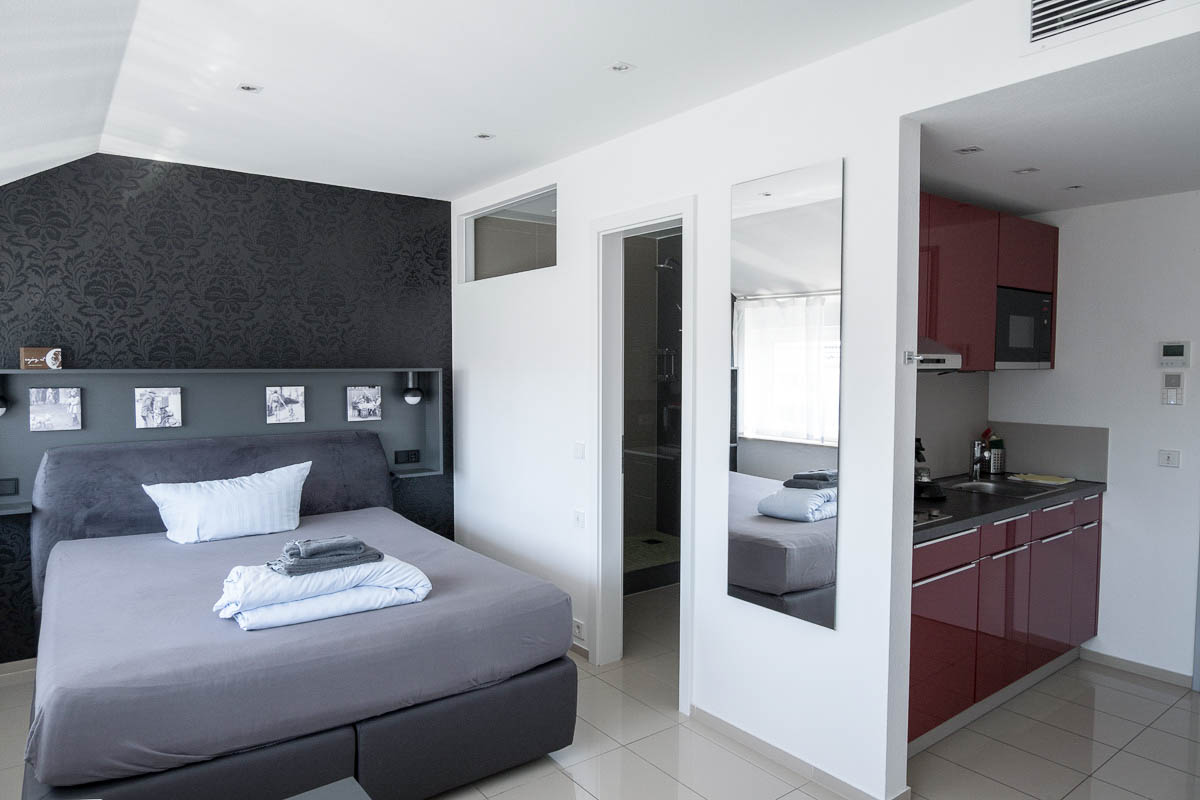
I stayed in this centrally-located aparthotel. Spacious and comfortable, the apartment’s well-equipped kitchen included an all-important washer-dryer and dishwasher. The staff could not have been more friendly.
>>> CLICK HERE FOR CURRENT PRICES
Here are a few other places that I had my beady eye on that might suit other travellers:
Mid-range hotel – Hotel Rappen am Münsterplatz
Stay right in the thick of things in this 3-star hotel overlooking the cathedral. It has a bar and restaurant with an outside terrace on the square and there are reduced rates for solo travellers.
>>> CLICK HERE FOR CURRENT PRICES
Splurge – Colombi Hotel
Treat yourself to a stay in Freiburg’s only centrally-located 5-star hotel. It has all the bells and whistles that you would expect from a luxury hotel including a swimming pool, spa and fitness centre and a classy bar and restaurant.
Its rooms are elegant and spacious and sometimes there are free upgrades to a swanky suite.
>>> CLICK HERE FOR CURRENT PRICES
Recommended Places to Eat
Thanks to its large student population, Freiburg is a great place to grab a plate of no-nonsense, affordable German grub. Here are a few places that I tried and loved:
Address: Kaiser-Joseph-Strasse 237
This is the place to go in the Old Town for schnitzel washed down with a glass of this microbrewery’s excellent beer. Book ahead or expect to queue for 30 minutes or more.
Address: Merianstrasse 8
If you’ve had your fill of sausages and schnitzel, try this cosy Vietnamese restaurant with outside seating. My meal was excellent and the service was friendly. They don’t serve alcohol but the mango iced tea was sublime.
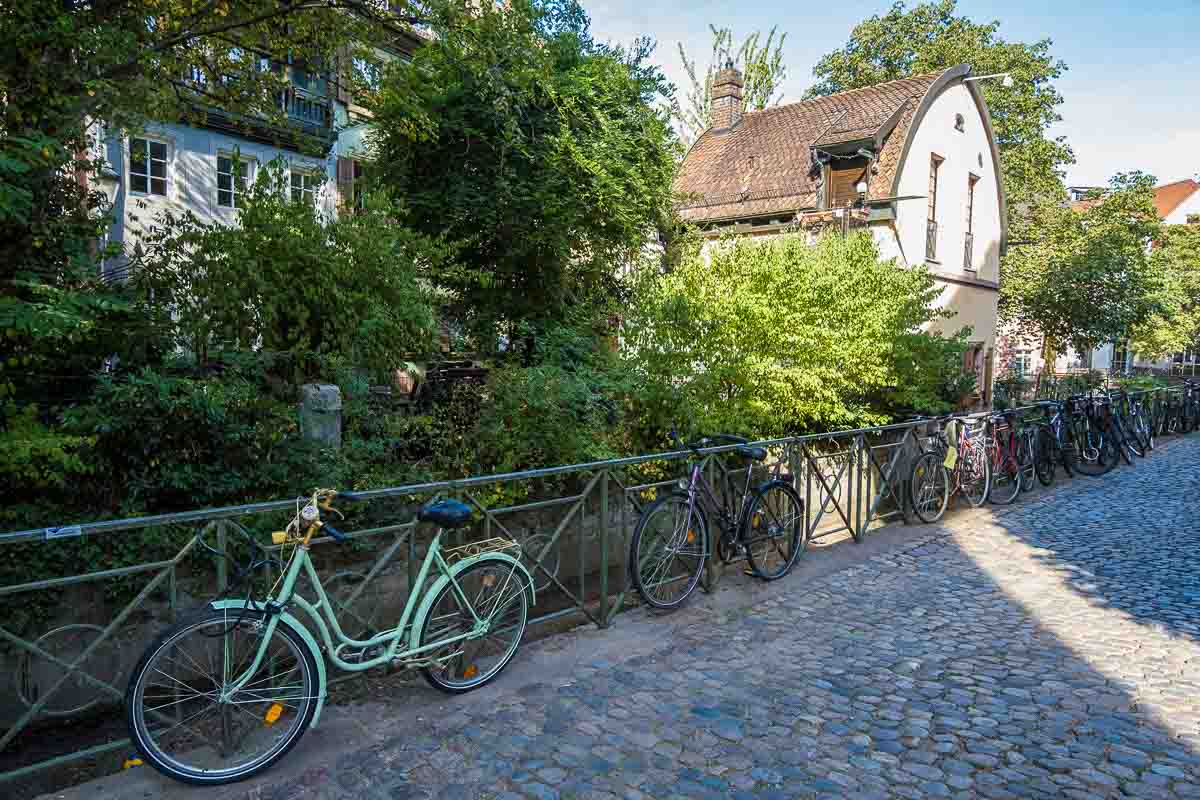
Solo Travel to Freiburg
Freiburg im Breisgau has something for every solo traveller and most places of interest are within walking distance of the city centre and free or cheap. In my view, it’s a good choice for first-time solo travellers.
Its lively student population keeps things real, with affordable microbreweries and restaurants that serve some of the best beer on the planet. Accommodation should not break the bank.
Freiburg is well-connected by rail, offering quick and easy access to other destinations in the region and beyond.
This is considered to be a safe destination for those travelling alone. The city has a low crime rate and is known for its relaxed and friendly atmosphere.
However, as with any destination, a little bit of common sense goes a long way. Solo travellers should take standard safety precautions, such as keeping valuables safe and avoiding dark and isolated areas at night.

About Bridget
Bridget Coleman has been a passionate traveller for more than 30 years. She has visited 70+ countries, most as a solo traveller.
Articles on this site reflect her first-hand experiences.
To get in touch, email her at hello@theflashpacker.net or follow her on social media.
